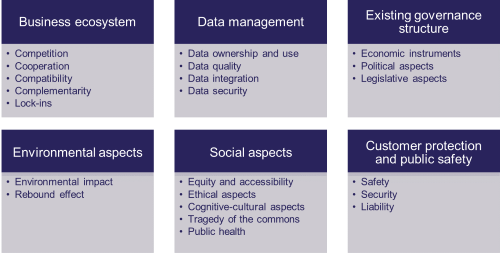GECKO published a report on the main economic, political and social factors influencing regulation of mobility innovations

Regulating transport aims to address several policy objectives, such as safety – for drivers, passengers, and other road users – social welfare, and social inclusion. Socio-economic objectives also include fair competition between various providers of transport services, privacy, and accessibility. Further policy objectives to be addressed regard the mitigation of externalities produced by transport, such as pollution and congestion.
The recent GECKO report provides an overview and analysis of various economic, political and social factors influencing policies and governance of the mobility sector, and evidences barriers and challenges linked to the introduction of emerging technologies. Altogether, 22 factors were identified and grouped in 6 broader categories.
This multitude of different aspects need to be addressed, in order to ensure that the proliferation of disruptive mobility solutions is beneficial for local or global mobility systems, and that it does not put at risk the safety, security and well-being of the society. First, the role of governing bodies is to assess the potential of a new mobility solution to solve transportation problems and create benefits for society. Second, it is necessary to identify what support is required in order to implement the solution successfully and realize the expected benefits. Third, potential negative impacts of a new mobility solution should be assessed and mitigated through various governance instruments.
Such a holistic and anticipatory approach to regulation of the mobility sector requires certain capabilities from policy-makers and governors. These capabilities include:
- Institutional power
- Cross-sector coordination
- Data management
- Technical competences e.g. in relation to autonomous mobility
- Pro-activeness and experimentation
- Innovation


